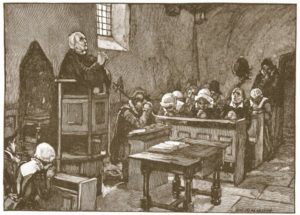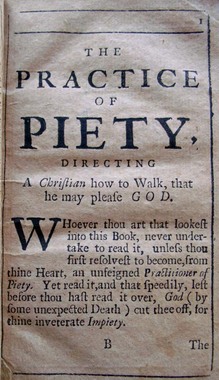“Prayer is the soul’s traffic with heaven. God comes down to us by his Spirit, and we go up to him by prayer . . . A godly man cannot live without prayer. A man cannot live unless he takes his breath, nor can the soul, unless it breathes forth its desires to God. As soon as the babe of grace is born, it cries; no sooner was Paul converted than ‘behold, he prayed’ (Acts 9:11) . . . A godly man is on the mount of prayer every day; he begins the day with prayer; before he opens his shop, he opens his heart to God. We burn sweet perfumes in our houses; a godly man’s house is ‘a house of perfume’; he airs it with the incense of prayer; he engages in no business without seeking God.” — Thomas Watson, The Godly Man’s Picture
Category Archives: Puritans
Flavel for Today’s Preacher
Paul was the apostle of Spirit-inspired repetition. He told the Philippians, “Finally, my brothers, rejoice in the Lord. To write the same things to you is no trouble to me and is safe for you.” Every pastor needs a regular dose of Jesus Christ. He needs repetitive fillings from God’s Spirit to preach with power.
We need to remember the same old things so that we may revel in the same old gospel every Lord’s Day.
Sometimes what we need is a simple, stirring reminder about proper preaching.
Statements to Stir You for Sunday
 I imagine every pastor has a preferred routine for getting his soul ready to preach on Sunday. Some rise extra early to pray and read God’s word. Others will fast from food that they might proclaim Christ with particular hunger. Yet others will listen to chosen music to raise their affections.
I imagine every pastor has a preferred routine for getting his soul ready to preach on Sunday. Some rise extra early to pray and read God’s word. Others will fast from food that they might proclaim Christ with particular hunger. Yet others will listen to chosen music to raise their affections.
I like to do all of that—and read a good old Puritan on preaching. The resource I return to as often as any other is John Flavel.
My favorite sermon from Flavel is titled, “The Character of a Complete Evangelical Pastor Drawn By Christ” (read it free here). The work is full of wisdom that I need to remember every single week. Consider these gems from the heavenly herald:
- “Believe it, brethren, it is easier to declaim, like an orator, against a thousand sins of others, than it is to mortify one sin, like Christians, in ourselves; to be more industrious in our pulpits, than in our closets; to preach twenty sermons to our people, than one to our own hearts.”
- “A crucified style best suits the preachers of a crucified Christ.”
- “A grave and proper style become the lips of Christ’s ambassadors.”
Other stirring words from Flavel to get you ready to ascend to the sacred desk this week would be:
- “We preach and pray, and you hear; but there is no motion Christward until the Spirit of God blows upon them.”
- “The excellency of a sermon lies in the plainest discoveries and liveliest applications of Jesus Christ.”
My brother preacher, remember today the glory of true Christ-centered preaching so that you might preach His glories on Sunday.
7 Implications from Puritan Preaching
 In his latest book, Some Pastors and Teachers: Reflecting a Biblical Vision of What Every Minister is Called to Be, Sinclair Ferguson has a wonderful chapter on the Puritans and ministers of God’s word. Near the end, he offers seven implications for preaching from their example.
In his latest book, Some Pastors and Teachers: Reflecting a Biblical Vision of What Every Minister is Called to Be, Sinclair Ferguson has a wonderful chapter on the Puritans and ministers of God’s word. Near the end, he offers seven implications for preaching from their example.
- A commitment to the hard work of studying, meditating on, and appyling to oneself the truth of Scritpure.
- A concern to speak God’s truth to all of God’s people, however simply they may be. The great Puritans were well-educated and highly intelligent ministers; but they knew that the concealment of art is also an art.
- Preaching the whole counsel of God, for the conversion of men and women, for the glory of God alone in whose presence both great and obscure must be exposed as sinners.
- Manifesting wisdom in teaching and applying the word of God, as well as the grace of God, in the very spiritof the preaching without “passion or bitterness.”
- Doing so with a sense of the gravitas which ought to characterize a servant of God. This influenced the minister’s physical demeanor and even the use of his voice. The preacher is neither joker nor trifler. He is not sent by God to entertain and amuse, for life is more of a tragedy than a comedy. Message and manner must harmonize or the message itself will be trivialized. Emotions and affections in preaching must be consistent with and expressive of the very substance of the text which is being expounded.
- Neither is the minister to be lugubrious and censorious, but rather filled with a loving affection for those to whom he ministers and preaches. Nothing is better calculated to win hearers than their knowledge that their minister has “a hearty desire to do them good.” The Puritans recognized that people will take a great deal from such a man.
- All this is to be backed up by a life which is consistent both in private and public with the message that is preached.
A Mentor in Grace
Yesterday, I read a portion of Spiritual-Mindedness by John Owen—a most excellent read on a slow Lord’s Day afternoon. Around page twenty-four, I realized 2017 is something like my ten-year anniversary with the Puritans. For it was just over a decade ago that I first feasted on their writings. And I owe it all—humanly speaking—to Dr. Joel Beeke.
A Round About Way
 In the spring of 2007, I read George Marsden’s Jonathan Edwards: A Life. What struck me most about the Northampton minister was his heavenly-mindedness. I then picked up a few more recent publications on Edwards that emphasized his pursuit of heaven on earth. 1 Those sources further cemented my attention on Edwards and heavenly-mindedness; things that, for me, at the time represented “Puritanism.”
In the spring of 2007, I read George Marsden’s Jonathan Edwards: A Life. What struck me most about the Northampton minister was his heavenly-mindedness. I then picked up a few more recent publications on Edwards that emphasized his pursuit of heaven on earth. 1 Those sources further cemented my attention on Edwards and heavenly-mindedness; things that, for me, at the time represented “Puritanism.”
Through online research, I eventually stumbled across the voluminous writings of Dr. Joel Beeke. With relish, I purchased and devoured his many books on Christian living, and the emphasis he gave to the Puritans did not go unnoticed. Thus, it was from Beeke’s many citations of Puritans that I began to move back from Edward’s and the mid-eighteenth century to the Westminster divines and the mid-seventeenth century.
My soul has never been the same.
A Mentor from Afar
He wouldn’t remember me, but I met Dr. Beeke at Together for the Gospel 2010 as he manned the Reformation Heritage book table. He immediately suggested I buy Meet the Puritans. My wife had given me the book for Christmas just a few months earlier, and so we struck up a short conversation on other books I might consider.
We later traded a few emails on my M.A. thesis: This is Not the End: Puritans on the Glory of Heaven. He was always kind and quick in his responses.
Over the years I’ve collected most of the books Dr. Beeke has published. Each one has served my life and ministry in countless ways. His Puritan Reformed Spirituality ignited a desire to pursue Ph.D. studies at SBTS in the area of Biblical Spirituality. His Parenting by God’s Promises: How to Raise Children in the Covenant of Grace shaped my role as a father in profound ways, and had a substantial role in my shifting views on baptism.
I don’t agree with Dr. Beeke on everything—as it always is with a mentor. But God has used him in my life almost as much as any living person. His passion for evangelism convicts me, his zeal for godliness inspires me, and his preaching of Christ humbles me.
Well Worth a Listen
One of my Sunday morning duties is ironing the family’s church clothes. De-wrinkling for seven can take a little while, so I tend to pass the time by listening to an edifying sermon. Yesterday I stumbled upon Dr. Beeke’s testimony. I’ve heard or read bits and pieces of it throughout the years, but never encountered his story of God’s grace in detail. And what a story it is!
I never cease to be amazed at how God works in the lives of His people. He overflows with wisdom and mercy toward all.
If you have an hour this week in traffic, on a run, or by the ironing board, listen in and be encouraged. You too might just find a new mentor in grace.
- See Stephen J. Nichols, Heaven on Earth: Capturing Jonathan Edwards’ Vision of Living in Between (Crossway, 2006); Steven J. Lawson, The Unwavering Resolve of Jonathan Edwards (Reformation Trust, 2008). ↩
2 Things Necessary
“There are two things which I have always judged chiefly requisite in a pastor, as he standeth related to his people—viz., labour and love. The former is a work of the head, the latter of the heart: faithful labour will speak his love, and sincere love will sweeten his labour. Labour without love is unacceptable to God; as a sweet perfume without fire, it cannot send forth its pleasant, fragrant savour. Love without labour is unprofitable to men; like Rachel, it is beautiful, but barren; both together—as soul and body are the essential parts of a man—are the whole of a minister.” — The Works of George Swinnock, 4:53.
In Praise of Plain Preaching
A lovely movement of retrieval is happening in Puritan studies. William Perkins is once again moving to center stage. How important is Perkins? J.I. Paker once said, “No Puritan author save Richard Baxter ever sold better than Perkins, and no Puritan thinker ever did more to shape and solidify historic Puritanism itself.” For too long the only work Christians have known from Perkins is his magnificent The Art of Prophesying. Thanks to Reformation Heritage, Perkins’ broader labor is readily available in The Works of William Perkins (projected to be a ten-volume collection).
If you’re unfamiliar with Perkins, you could pick up this little biography or this useful treatment of his Sermon on the Mount expositions. Or you might watch Sinclair Ferguson’s recent lecture entitled, “William Perkins: A Plain Preacher.” It’s full of wisdom and usefulness.
A Platform for Piety
 In his runaway 17th-century bestseller, Practice of Piety, Lewis Bayly says true godliness is: “to join together, in watching, fasting, praying, reading the Scriptures, keeping his Sabbaths, hearing sermons, receiving the holy Communion, relieving the poor, exercising in all humility the works of piety to God, and walking conscionably in the duties of our calling towards men.”
In his runaway 17th-century bestseller, Practice of Piety, Lewis Bayly says true godliness is: “to join together, in watching, fasting, praying, reading the Scriptures, keeping his Sabbaths, hearing sermons, receiving the holy Communion, relieving the poor, exercising in all humility the works of piety to God, and walking conscionably in the duties of our calling towards men.”
Glenn Hinson says Bayly’s statement summarizes “the whole Puritan platform.”
That’s one platform, in this platform-wild election season, I can support.
Twenty Encouragements for Church Members

On “Farewell Sunday” in August of 1662 countless Puritan “non-conformist” pastors delivered last sermons as a result of The Great Ejection. Thomas Watson, that rich and racy preacher, offered two farewell messages to the St. Stephen’s, Walbrook congregation. In the second he gave “twenty directions . . . as advice and counsel with you about your souls.” Here they are in brief. What a window into faithful ministry.
20 Directions to Church Members
- Keep constant hours every day with God.
- Get good books in your houses.
- Have a care of your company.
- Have a care whom you hear.
- Follow after sincerity.
- As you love your souls, be not strangers to yourselves.
- Keep your spiritual watch.
- You that are the people of God, often associate together.
- Get your hearts screwed up above the world.
- Trade much in the promises.
- To all you that hear me, live in a calling.
- Let me entreat you to join the first and second tables of the law together, piety to God, and equity to your neighbor.
- Join the serpent and dove together, innocence and prudence.
- Be more afraid of sin than of suffering.
- Take heed of idolatry.
- Think not the worse of godliness because it is reproached and persecuted.
- Think not the better of sin because it is in fashion.
- In the business of religion serve God with all your might.
- Do all the good you can to others as long as you live.
- Every day think upon eternity.
Read all this and more in Sermons of the Great Ejection.
He’s Got it Right
The Puritans & Preaching
Perhaps no individual has influenced me so profoundly as that modern-day Puritan Joel Beeke. He first introduced me to experiential preaching, the necessity of personal piety, the glory of prayer, and the vitality of the Holy Spirit.
A few months ago Beeke delivered the keynote messages at Westminster Theological Seminary’s 2015 Preaching Conference. The following two messages will edify any preacher and, I trust, stir him up the renewed earnestness in gospel ministry. The panel discussion at the end with The Mortification of Spin team (70,000 listeners every week!?!) is also quite useful. If you only listen to part of it make sure to listen to the first section where the brothers each share their call into ministry—most encouraging!
